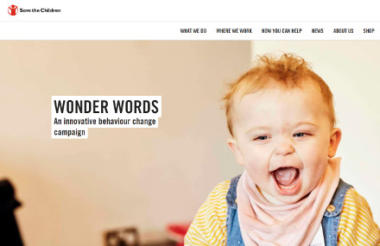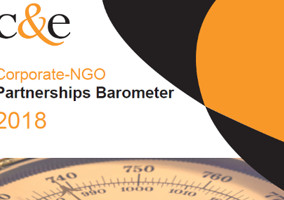Save the Children and Johnson & Johnson have been working together to strengthen the world for future generations for more than two decades. Our shared vision is to ensure a world where every single child can reach their full potential - healthy, happy, and with the best possible access to education.
Through our partnership in the UK, we have been able to impact the lives of over 3,000 children in the most disadvantaged communities, ranging from providing essential items to families, to working with parents through schools to empower them to support their child’s healthy development at home.
Our latest collaboration, Wonder Words, takes a behaviour change approach to empower families in these communities to help improve their children’s early language development. Behaviour change or behavioural science is based on insight into what makes people tick - from their daily routines and worries to what’s on their shopping lists. It's not about just telling people what to do, but about using that insight to understand why people behave the way they do and empowering them to make change happen.
For families who are struggling financially and working long hours with high levels of stress, they often have less quality time available to sing, talk to and play with their young children at home. Losing out on those everyday moments has serious implications for child development. Coupled with less exposure to books and educational days out, children from the poorest backgrounds are at risk of falling behind before they have even entered the education system.
What is clear is that many will struggle to ever catch up. A study following over 11,000 children born in Britain through to adulthood found that children with poor vocabulary skills at age 5 were four times more likely to have reading difficulties, three times as likely to have mental health problems and twice as likely to be unemployed than the average person by the time they reached adulthood.
To address this issue, Save the Children needed to identify and utilise the channels that these families already use to effect behaviour change - like consumer brands, everyday household products, and the local community environments they spend time in. Johnson & Johnson has a wealth of insights around this audience and the topics of parenting, families and early years development, which it has been sharing with Save the Children to inform the key messages and approach of the Wonder Words campaign. This is where the true shared value of our partnership lies; it is amazing to be able to leverage commercial insight to make a positive impact on society at large.
One great example of this came from implementing Johnson & Johnson’s “Consumer Closeness” approach to help Save the Children bring ethnographic research into their everyday ways of working. Working together to get a better understanding of ‘Dads’ and their role and perspectives on raising 0-3 year olds, Johnson & Johnson facilitated a number of interviews and provided access to internal resources. Johnson & Johnson was also able to introduce areas of its business that could offer strategic insights into the campaign, such as the BABYCENTRE® platform and the NICORETTE® brand, both of which have been able to feed into workshops and provide insights on behaviour change.
A key focus of the work together on Wonder Words has been to optimise our messaging approach through a combination of research and the application of behavioural science. This topic was recently explored further at Department for Education’s Home Learning Environment Summit, attended by both Johnson & Johnson and Save the Children where we were invited to talk about the Wonder Words campaign.
We are now delighted to be rolling out and testing a new approach to strengthen our knowledge about what works and our ability to help disadvantaged families even more.
We will be running a two-week Out-of-Home (“OOH”) advertising trial across 60 sites in the London Borough of Tower Hamlets, in late December. This will allow us to evaluate the messaging and principles we have developed together and gain a deeper understanding of OOH as a channel.
We’re excited about the future of this campaign and the results of the advertising trial. Wonder Words presents a real opportunity to help those in need, change behaviours and ultimately give every single child the best chance to succeed.
Rhoda Steel is UK head of corporate social responsibility at Johnson & Johnson and Jane Lewis is head of UK programme development & quality at Save the Children.
|
Related articles











